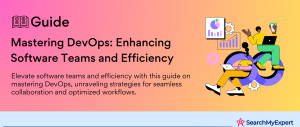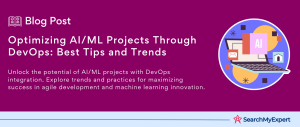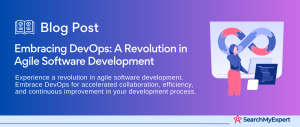The Evolution of DevOps: Understanding its Core and Future Impact
DevOps, a blend of “Development” and “Operations,” is a revolutionary approach that integrates software development and IT operations. It aims to shorten the system development life cycle while delivering high-quality software continuously and efficiently.
Core Principles of DevOps
At the heart of DevOps are several key principles:
- Collaboration and Communication:
DevOps fosters a culture where developers, operations teams, and other stakeholders work closely together. This synergy enhances understanding and efficiency, leading to faster problem-solving and innovation. - Automation:
DevOps emphasizes automating as much of the software delivery process as possible, including integration, testing, deployment, and infrastructure management. Automation reduces human error, increases consistency, and speeds up processes. - Continuous Integration and Continuous Deployment (CI/CD):
CI/CD practices ensure that code changes are automatically tested and deployed, allowing for frequent and reliable releases. - Monitoring and Feedback:
Continuous monitoring of applications and infrastructure is critical in DevOps. It provides valuable feedback to teams, helping them to quickly identify and address issues. - Flexibility and Adaptability: DevOps encourages an adaptive mindset, with teams ready to respond to changing requirements and technologies.
Impact of DevOps on Software Development
The implementation of DevOps practices has significantly altered software development and release cycles:
- Speed and Efficiency:
DevOps has dramatically shortened the time from development to deployment, enabling organizations to release new features and fixes much faster. - Improved Quality: Continuous testing and monitoring ensure that issues are identified and resolved early in the development process, leading to higher-quality software.
- Enhanced Collaboration:
Breaking down silos between development and operations teams leads to better communication, shared responsibilities, and a more cohesive approach to problem-solving.
The Future of DevOps
Exploring the future of DevOps is crucial as it continues to evolve with emerging technologies. This journey promises advancements in areas like AI and machine learning, further automation, and enhanced security practices. Understanding where DevOps is headed helps organizations stay ahead of the curve, ensuring they are well-equipped to handle the challenges and opportunities of the digital era.
Transformative Trends in IT: Steering DevOps into the Future
The landscape of Information Technology (IT) is constantly evolving, and DevOps is at the forefront of this transformation. Key trends and technologies are shaping the future of IT and, by extension, influencing the evolution of DevOps practices.
Key Trends and Technologies Influencing DevOps
- Artificial Intelligence (AI) and Machine Learning (ML): AI and ML are becoming integral to DevOps, offering predictive analytics, enhanced automation, and improved decision-making. AI-driven DevOps, or AIOps, can anticipate problems, optimize processes, and automate responses, leading to more proactive and intelligent operations.
- Increased Automation:
Automation is a cornerstone of DevOps, but its scope is expanding. From code generation to testing, deployment, and monitoring, automation is becoming more sophisticated, reducing manual work and increasing efficiency. - Cloud Computing: The shift to cloud-native technologies continues to accelerate. Cloud platforms provide a scalable and flexible environment that is ideal for DevOps practices, enabling rapid deployment and easier management of applications and services.
- Containerization and Microservices:
Container technologies like Docker and orchestration tools like Kubernetes are reshaping application development. They facilitate the creation of lightweight, portable, and scalable applications, which align perfectly with DevOps objectives. - Infrastructure as Code (IaC):
IaC is transforming how infrastructure is provisioned and managed, making it more consistent and efficient. Tools like Terraform and AWS CloudFormation enable teams to automate the setup and scaling of environments, further embedding DevOps principles.
Impact on the Current DevOps Landscape
These trends are not just influencing the future; they are actively reshaping the current DevOps landscape:
- Enhanced Collaboration:
AI and automation tools are fostering better collaboration between developers and operations teams, breaking down traditional silos. - Faster and More Reliable Releases: Automation, coupled with cloud computing, enables quicker and more reliable software releases, aligning with the continuous delivery model of DevOps.
- Improved Quality Assurance:
With AI-driven analytics and automated testing, teams can achieve higher quality assurance standards, reducing the incidence of bugs and downtime.
Emerging Tools and Frameworks in DevOps
Several tools and frameworks are emerging as game-changers in the DevOps pipeline:
- AI-Powered Monitoring Tools:
Tools like Dynatrace and New Relic use AI to provide advanced monitoring and analytics, enabling teams to anticipate and solve issues before they impact the end user. - Serverless Architectures:
Platforms like AWS Lambda and Azure Functions are promoting a serverless approach, where developers can focus on code rather than infrastructure management. - Progressive Delivery Techniques:
Techniques like canary releases and feature flags, enabled by tools like LaunchDarkly, are becoming popular for controlling and optimizing the deployment process.
The New Era of DevOps: Culture, Security, and Continuous Learning
As DevOps continues to evolve, it’s not just the tools and technologies that are transforming; the very culture and practices that underpin DevOps are also undergoing significant changes. This evolution is essential for organizations to remain competitive and secure in a rapidly changing digital landscape.
Rethinking Team Structures and Collaboration
- Cross-Functional Teams:
The future of DevOps lies in cross-functional teams that encompass a range of skills, from development and operations to security and quality assurance. These teams work collaboratively, blurring the lines between different roles. - Remote and Distributed Work:
With the rise of remote working, DevOps teams are increasingly becoming distributed. This shift necessitates new collaboration models and communication tools to ensure that teams remain cohesive and effective, regardless of their physical location. - Emphasis on Soft Skills:
Soft skills like communication, empathy, and teamwork are becoming as important as technical skills. These competencies are essential for fostering a collaborative and inclusive DevOps culture.
Security and Compliance in DevOps
The integration of security into DevOps, often referred to as DevSecOps, is becoming a cornerstone of modern DevOps practices.
- Shift-Left Security: This approach involves integrating security early in the development lifecycle. It means that security considerations are not an afterthought but are embedded throughout the development process.
- Automated Security and Compliance Checks: The use of automated tools for security testing and compliance checks is on the rise. These tools can scan code for vulnerabilities, enforce compliance standards, and ensure that security is maintained at every stage of the development pipeline.
- Building a Security-Conscious Culture: Encouraging a culture where every member of the team takes responsibility for security is crucial. Training and awareness programs are essential in cultivating this mindset.
Continuous Learning and Adaptability
The fast-paced nature of technology means that DevOps teams must be committed to continuous learning and adaptability.
- Upskilling and Reskilling:
As new tools and technologies emerge, DevOps professionals need to continually upskill and reskill. This continuous learning is crucial for staying current with industry trends and best practices. - Embracing Experimentation and Innovation:
A culture that encourages experimentation and tolerates failure is key to innovation in DevOps. Teams should be empowered to try new approaches and learn from their experiences. - Agility and Flexibility:
The ability to adapt to changing requirements, technologies, and market conditions is a vital trait for future DevOps teams. This agility ensures that organizations can respond swiftly and effectively to new challenges and opportunities.
The Rise of Automation and Self-Service in DevOps
In the evolving world of DevOps, two trends are becoming increasingly prominent: the expansion of automation and the adoption of self-service platforms. These advancements are fundamentally reshaping the way infrastructure and applications are managed, offering both new opportunities and unique challenges.
Enhanced Automation in Infrastructure and Application Management
- Automated Infrastructure Management:
The automation of infrastructure management is revolutionizing the DevOps landscape. Tools like Terraform, Ansible, and Puppet allow for the automatic provisioning, configuration, and management of servers and systems. This shift not only streamlines operations but also ensures consistency and reliability across environments. - Application Management Automation:
On the application side, automation is equally transformative. Continuous Integration and Continuous Deployment (CI/CD) pipelines automate the process of integrating code changes, testing, and deploying to production. This leads to faster release cycles, reduced errors, and a more agile response to market needs. - Predictive Analytics and Maintenance:
Advanced automation now incorporates AI and machine learning for predictive analytics and maintenance. These technologies can anticipate issues, optimize performance, and automate problem resolution, further reducing downtime and improving user experience.
The Emergence of Self-Service Platforms
- Empowering Teams: Self-service platforms in DevOps empower developers and operations teams to access the resources and tools they need with minimal barriers. This approach democratizes access to technology, enabling faster innovation and experimentation.
- Streamlining Development Processes:
By providing a user-friendly interface and automated workflows, self-service platforms make it easier for teams to deploy applications, manage resources, and monitor performance. This reduces the complexity and time involved in these processes. - Customization and Flexibility:
Self-service platforms offer customization options, allowing teams to tailor resources and workflows to their specific project requirements, while maintaining overall control and governance.
Navigating the Challenges and Opportunities
- Managing the Balance Between Automation and Control:
With increased automation, maintaining the right balance between automated processes and human control is crucial. Ensuring that automated systems align with business goals and are monitored for potential issues is essential. - Addressing Complexity:
As automation and self-service platforms become more sophisticated, managing their complexity becomes a challenge. Adequate training, clear documentation, and user support are critical to ensure effective utilization. - Security and Compliance:
The automated and self-service nature of these platforms raises significant security and compliance considerations. Integrating robust security measures and ensuring compliance with regulations is imperative to protect data and maintain trust.
Continuous Intelligence and Optimization in DevOps
The integration of artificial intelligence (AI) and machine learning (ML) into DevOps marks a significant step forward in how monitoring, analytics, and decision-making processes are conducted. This integration, often termed as “continuous intelligence,” is reshaping the DevOps landscape, enabling teams to optimize processes dynamically and make more informed decisions.
AI and Machine Learning in DevOps
- Advanced Monitoring and Analytics:
AI and ML technologies are being leveraged for sophisticated monitoring and analytics in DevOps environments. These technologies can analyze vast amounts of data from various sources, identify patterns, and predict potential issues before they impact operations. - Intelligent Decision-Making:
AI-driven tools aid in decision-making by providing insights and recommendations based on real-time data. This ability enhances the responsiveness and agility of DevOps teams, allowing them to make informed decisions quickly. - Automating Complex Processes: AI and ML can automate complex and time-consuming processes, such as identifying the root causes of problems, optimizing resource allocation, and tuning performance. This automation not only saves time but also reduces the likelihood of human error.
Continuous Feedback Loops and Optimization
- Real-Time Feedback and Adaptation:
Continuous intelligence enables the creation of real-time feedback loops. These loops provide immediate insights into the performance and health of applications and infrastructure, allowing teams to adapt and optimize processes continuously. - Predictive Analytics and Proactive Measures:
By using predictive analytics, DevOps teams can anticipate issues and take proactive measures to mitigate them. This foresight reduces downtime and improves the reliability of services. - Performance Optimization:
Continuous optimization of processes, based on AI-driven insights, leads to improved efficiency and performance of both applications and infrastructure.
Ethical Considerations in AI-Driven DevOps
- Bias and Fairness: AI systems can inherit biases present in their training data, leading to unfair or unethical outcomes. It’s crucial for DevOps teams to ensure that AI models are trained on diverse, unbiased datasets and are regularly audited for fairness.
- Transparency and Accountability:
There should be transparency in how AI-driven decisions are made within DevOps processes. Maintaining clear records and being able to explain the rationale behind AI-driven decisions is essential for accountability. - Data Privacy and Security: The use of AI in DevOps involves handling large amounts of data, some of which may be sensitive. It is imperative to implement strong data privacy and security measures to protect this information and comply with regulations.
Fortifying Security and Resilience in Future DevOps
In an era where cybersecurity threats are becoming more sophisticated and pervasive, the significance of security and resilience in DevOps cannot be overstated. As DevOps environments become increasingly interconnected and complex, addressing the evolving security landscape and reinforcing system resilience are paramount.
Addressing the Evolving Security Landscape
- Continuous Security Monitoring: In the future DevOps framework, continuous security monitoring will be crucial. This involves the real-time scanning and analysis of systems to detect potential threats or vulnerabilities.
- Dynamic Threat Landscape:
With the rapid evolution of technology, the threat landscape is constantly changing. Future DevOps practices must be agile enough to adapt to new types of cyber threats, including sophisticated malware, ransomware, and phishing attacks. - Integrating Security in the DevOps Pipeline:
The concept of ‘DevSecOps’ — integrating security into every stage of the DevOps pipeline — is becoming a necessity. This integration ensures that security is not an afterthought but a fundamental component of the development and deployment process.
Robust Security Practices and Automated Vulnerability Detection
- Automating Security Checks:
Automated tools for security testing and vulnerability scanning will become indispensable in future DevOps. These tools can continuously check for vulnerabilities, compliance issues, and other security risks. - Security as Code: Implementing security as code, where security policies and configurations are codified and version-controlled, ensures consistency and reliability in security practices.
- Incident Response Automation:
Quick and effective response to security incidents is vital. Automating certain aspects of incident response can expedite the containment and resolution of security breaches.
Building Resilient Systems and Disaster Recovery
- Resilience by Design:
Future DevOps practices will focus on building resilience into systems from the ground up. This involves designing systems and applications that can withstand failures and attacks without significant disruption. - Effective Disaster Recovery Plans: Robust disaster recovery plans are essential. These plans should be regularly tested and updated to ensure they remain effective against the latest threats and in various scenarios.
- Learning from Failures:
Adopting a mindset of learning from failures and near-misses, to continuously improve system resilience and recovery strategies, will be an integral part of future DevOps cultures.
Embracing the Future of DevOps: Key Takeaways and Next Steps
As we conclude our exploration of the future of DevOps, it’s clear that this field is on the brink of a transformative era. The integration of new technologies, evolving cultural practices, and heightened security measures are paving the way for a more efficient, resilient, and responsive IT landscape.
Summarizing the Future of DevOps
- Integration of AI and Automation:
The incorporation of AI and machine learning, coupled with advanced automation, is revolutionizing infrastructure and application management, leading to smarter, faster, and more reliable processes. - The Rise of Self-Service Platforms:
The adoption of self-service platforms empowers teams, streamlines development processes, and offers greater flexibility in resource management. - Evolving Team Dynamics and Culture:
The shift towards more collaborative, cross-functional team structures, with an emphasis on continuous learning and adaptability, is redefining the DevOps culture. - Continuous Intelligence and Optimization: The use of continuous intelligence, driven by AI and ML, enables real-time feedback loops and ongoing optimization of DevOps processes.
- Strengthening Security and Resilience:
Addressing the evolving security landscape through robust security practices and automated vulnerability detection, and building resilient systems with effective disaster recovery plans, are critical for future DevOps.
Call to Action
The future of DevOps offers immense opportunities for growth, innovation, and improvement. It is imperative for individuals and organizations to:
- Embrace Change: Stay abreast of emerging trends and technologies in DevOps.
- Invest in Skills Development: Focus on continuous learning and skill enhancement, particularly in areas like AI, automation, and security.
- Foster Collaboration and Inclusivity:
Cultivate a culture that values collaboration, inclusivity, and cross-functional teamwork. - Prioritize Security and Resilience:
Integrate robust security measures and build resilient systems to safeguard against current and future threats.
Exploring Beyond
Looking ahead, there are several areas ripe for further exploration in the realm of DevOps:
- Sustainability in DevOps:
Exploring how DevOps practices can contribute to more sustainable and environmentally friendly IT operations. - The Role of Quantum Computing:
Understanding how emerging technologies like quantum computing could impact DevOps practices in the future. - Ethical AI in DevOps:
Delving deeper into the ethical implications of AI-driven DevOps and developing frameworks to ensure responsible use of AI.
Conclusion:
As we navigate the evolving world of DevOps, it becomes evident that the field is not just about tools and technologies; it’s about a cultural and methodological revolution. The future of DevOps is characterized by the seamless integration of AI and automation, the empowerment of teams through self-service platforms, and the paramount importance of security and resilience. These developments are not merely trends; they are the stepping stones to a more agile, efficient, and secure IT environment. For professionals and organizations alike, the call to action is clear: embrace the evolution, invest in continuous learning, and foster a culture of collaboration and innovation. By doing so, we can not only adapt to the changes of today but also shape the DevOps landscape of tomorrow.
Integrate and automate your development processes with our DevOps Services.
Table of Contents
Toggle






